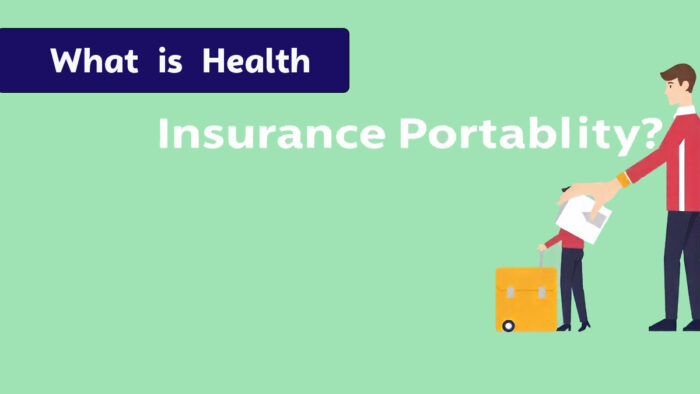Health insurance portability makes health coverage more accessible and user-friendly by allowing you to switch insurance providers without losing your accumulated benefits. This concept is just the same as switching telecom service providers but retaining your number.

In literal terms, insurance portability means you can change your health insurance company or plan without losing benefits like waiting periods and other accrued advantages. T
This is particularly a very good one if you need urgent and expensive medical care while switching policies. Without portability, a new policy might leave you without coverage for the first 30 to 90 days, depending on the terms of the plans.
When and why was Portability Introduced?
In India, health insurance portability was introduced by the Insurance Regulatory and Development Authority of India (IRDAI) in 2011. This came in response to requests from consumer associations and policyholders who wanted to switch insurers without losing benefits.
The primary reason for introducing portability was to keep policyholders from losing coverage for pre-existing conditions. As most policies had exclusions for these conditions during the first year with a new insurer.
From 2011 to 2020, portability required no “break in policy,” meaning continuous coverage was necessary. In 2020, IRDAI removed this requirement, allowing policyholders to transfer their accrued benefits even if they missed or deferred premium payments with their old insurer. This change especially helps those who couldn’t port their policies before due to breaks in coverage, ensuring their pre-existing condition waiting periods are honored by the new insurer.
Common Reasons for Health Insurance Portability
Just as I have mentioned above, health insurance portability allows policyholders to switch insurers while retaining benefits like waiting period credits and no-claim bonuses. Here are some common reasons people choose to switch:
- Better Coverage and Benefits: People often look for more comprehensive coverage or specific treatments not offered by their current policy. Switching helps them find plans that better meet their needs.
- Cost-effectiveness: Many switch to find similar or better coverage at a lower premium. Saving money while maintaining good coverage is a smart financial decision.
- Customer Service: Poor customer service, such as delays in claim settlements or lack of responsiveness, can prompt a switch to an insurer with a better reputation for service.
- Network Hospitals: The availability of network hospitals is crucial. If someone moves to an area with limited or no network hospitals under their current insurer, they may switch to one with a better network in that region.
- Relocation or Change in Circumstances: Relocating to a different city or state where the current insurer has limited coverage often leads to switching to a company with a broader network in the new location.
- Age and Health Conditions: As people age or their health conditions change, they might seek policies better suited to their current health needs, with better terms for specific age groups or health situations.
- Policy Flexibility and Customization: Some people want more flexibility in choosing add-ons or riders that fit their lifestyle or health needs. Switching to a more customizable plan is a very popular reason why people go for portability.
- Enhanced Sum Insured: Increased medical costs or life changes, like starting a family, might lead individuals to seek higher coverage. Portability allows them to switch to policies with higher sums insured.
- Policy Exclusions and Waiting Periods: To avoid waiting periods or exclusions for pre-existing conditions in their current policy, individuals might switch to a new policy with better terms.
Understanding these reasons helps individuals make informed decisions when considering switching their health insurance.
How to Port Your Health Insurance Policy
To switch your health insurance to a new provider, follow these steps as outlined by the IRDAI:
- Apply Early: You need to go for portability at least 45 days before your current policy is over.
- Complete Forms: The new insurer will provide forms for you to fill out and offer details on available health insurance plans, including premiums and terms.
- Choose a Plan: Select the desired plan and coverage, then submit all required documents.
- Information Review: The new insurer will review your information, including previous claims history and medical records, either from your current insurer or through the regulator’s data-sharing platform.
- Decision: The new insurer has 15 days to decide whether to accept your portability request based on the information provided.
Rights as a Policyholder for Health Insurance Portability
When porting your health insurance, you have different rights as a policyholder. Check out these rights below:
- Switch at Renewal: You can change insurance companies and plans at each renewal.
- Maintain or Increase Sum Insured: Your new policy must at least match the minimum sum insured of your last policy, but you can choose to increase it if you wish.
- Acknowledge Waiting Period: The new insurer must recognize any waiting period already served under your previous policy.
Portability is a guaranteed right, and both your current and new insurers must honor your request. If you follow the necessary procedures and meet the insurer’s risk and coverage requirements for the chosen plan, the process will be very simple.
This provision allows individuals to switch to better insurance plans or providers, making health insurance more accessible and affordable.
Disadvantages of Health Insurance Portability
Switching health insurance providers without losing benefits sounds great, but there are some downsides. Below are some of these disadvantages.
- Limited Choices There aren’t many insurers in the country offering portability, so your options might be limited when you want to switch.
- Different Coverage Terms New insurers may have different terms and conditions, meaning something covered by your old policy might not be covered by the new one, which can be confusing.
- Premium Changes Switching insurers can lead to changes in your premium. It might go up based on your age, health, or other factors, making it more expensive than before.
- Claims Processing Delays Changing to a new insurer might cause delays in claim settlements as the new company takes time to review your medical history.
Long-term loyalty to your insurer often comes with perks like no-claim bonuses. Switching might mean losing these benefits accumulated with your previous insurer. However, just as I have mentioned above, without portability, a new policy might leave you without coverage for the first 30 to 90 days, depending on the terms of the plans.



